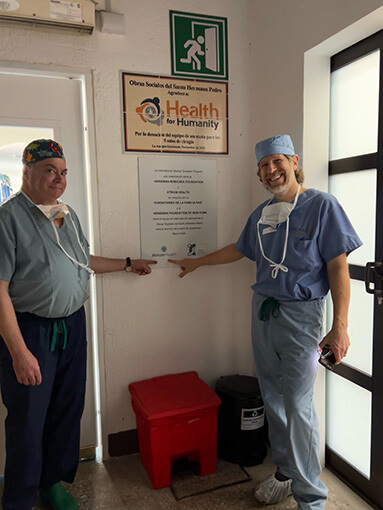
There are thousands of quotes and even research that support the idea that giving of yourself brings happiness. So it’s no surprise that James Mooney, MD, and John Frino, MD, pediatric orthopaedic surgeons at Atrium Health Wake Forest Baptist Brenner Children’s Hospital, are passionate about their medical mission trips to Antigua, Guatemala.
They are part of a medical team that travels to a former monastery called Obras Sociales del Santo Herman Pedro, which has been partially converted into a hospital. The facility welcomes more than 40 medical mission groups from all over the world each year. The services provided by Mooney and Frino are particularly invaluable – there is only one other fellowship-trained pediatric orthopaedist in the entire country, and access to pediatric orthopaedic care is very limited.
Twice a year, they travel to Antigua to provide life-changing surgeries for children who travel there from all over the country.
“I call it ‘fantasy camp’ for surgeons because I get to do all the things that I really enjoy – taking care of children, feeling like we’re actually making a difference and taking care of pretty serious orthopaedic conditions that otherwise wouldn’t be cared for,” says Frino.
Mooney was invited to participate by fellow Wake Forest Baptist colleagues in 2001 and has been back nearly every year since. Frino has taken five trips and says that it has also become his first priority.
They say without these surgeries, many of these kids will not be able to provide for their families when they grow up. Unlike the U.S., Guatemala doesn’t have disability services. People often must rely on charity from churches and neighbors to support their families if their disabilities hinder their ability to work.
Many of the cases they see are clubfoot deformities or hip dislocations, which in developed countries are treated early , usually within the first week or two of birth. But some of the patients in Guatemala may not receive treatment until age 10. Mooney said the most cases he has treated is nine hip dislocations in a week compared to one or two a year in the U.S.
“I was able to reach a level of comfort with the procedure that would have taken years to reach otherwise,” adds Frino. "The volume of this work we do in Antigua really makes a difference.”
Both doctors say the patients are endearing, and they recall memorable cases, like the girl whose only dream was to ride a bike. Or the little boy who stopped to get a haircut on the way to his operation so that he could impress the nurses.
Much of the country is impoverished, and transportation to Antigua is often difficult for patients and families. Many patients come from up to 12 hours away by bus. Mooney says it doesn’t break their spirit.
“They are incredibly thankful when we care for them,” he said. “We may not always have the facilities or the equipment or the time available, but we look forward to helping improve the lives of these children each trip.”
